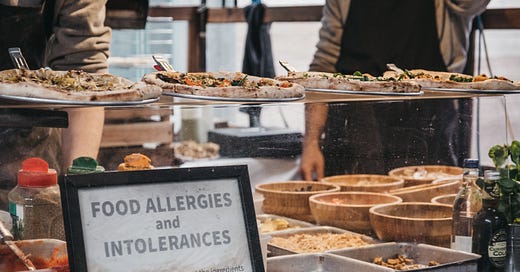End Food Shaming Now
Never in the history of mankind have we been so divided, inclusive, and accommodating all at once. We are inundated with inclusive language directives, educated on proper pronoun usage, and offered guidance on every aspect of human interaction in the modern post Covid world.
Yet for some reason people with special dietary needs are still left out, stigmatized, and even chastised for being “picky” when really, all they want is to not be poisoned. Last week at a quick service restaurant the prepper told me they weren’t going to make my sandwich because of how my request made them feel.
Nearly a decade ago, I survived life changing body altering surgery. I elected to do this for a variety of health reasons and while this procedure has been on the medical books since the 1990’s surprisingly little is known about how individuals interact with food on a long term basis.
In spite of millions of patients living and thriving post-surgery for decades, doctors told me trial and error was the best route for my recovery. The inconvenient reality is some people spend years recovering. Liquid diets, protein only pastes, and meal plans are big business but it’s up to the individual to sort out what works. It’s a tough road with daily consequences that include severe abdominal pain, vomiting and mad dashes to the bathroom.
Can you imagine the conversations when eating out, buying food or gathering with friends? So, what are you, a vegetarian? Not exactly. Well, pescatarian? Not really. No dairy? Well, some diary is OK. It’s not a pleasant conversation and I honestly don’t mind talking about it with close friends. I am amazed when strangers feel comfortable – making you uncomfortable – by asking the questions. It’s the last bastion of polite society labeling.
I’d like to tell you that I realized how to adjust quickly but to this day I still experience complications. There are definite no-no’s that I learned but it’s not like you can label a particular type of food or dietary doctrine. For example, I can nosh on sliced turkey but red meat will 100% guarantee vomiting and excruciating pain. Wheat thins are good to go but take a bite of white bread and I’ll be doubled over praying for the last friend to call. Greek yogurt is a green light, yet butter will initiate digestive drama. No matter how you slice it, you come off as gratuitously persnicketouss.
It doesn't make sense to people, I get it, but we must turn on some of that universal compassion I’m always reading about. Millions of people are navigating these challenges. Traveling with your own food, nutty conversations and in general being on high alert 24/7/365 is no fun.
The negative stigma and characterizations of people who have endured bariatric procedures also adds a layer of challenge. Books have been written about the trials and tribulations of navigating the complications, and talking about these intimate details of your life is at the very least uncomfortable.
In the ten years following going under the knife, fitness has been an important part of my recovery. I have issues with the constant upsell and member-for-life imprisonment model that gyms use, but it’s a necessary evil. I go to one such destination near my home called Life Time. It’s a huge complex with lots of options, including a spa, café, daycare, and even a hair salon.
I find myself at the gym religiously trying to walk back the aging process and occasionally getting a snack at the cafe. I need to eat 300 to 400 calorie meals several times a day and despite the service being lackluster to awful at the “café” it’s convenient. It was also a major selling point of membership.
They have nice sandwiches but I’m very careful with breads because they clump up in my stomach. Ever see someone eat a sandwich with a knife and fork? I do, it’s very Seinfeldian. I do the same thing with Pizza to avoid the bread. It’s awkward but I manage. I tried asking for a sandwich with no bread, but it’s another awkward conversation that gets looks, stares and odd questions from food preppers.
One time I picked up a readymade turkey avocado from the deli case. It came with a slathering of aioli. I found out the hard way that aioli is just a fancy word for mayo. I own that one, par for the course, it happens.
Last week I went to get a bite after a swim with my six-year-old. I ordered a no aioli sandwich citing a food allergy. It’s easier to say “food allergy” rather than get into the bypass thing. I asked the order taker twice because the last time I ordered it without mayo, they added it anyway and I had to ask for a redo. After about 15 minutes, I went to the counter to ask how we were doing on the sandwich and noted the allergy again.
After a lecture about how busy they were, the prepper begrudgingly handed me my sandwich about ten minutes later, mayo and all. There I was. If I say something, I’m a Karen. If I don’t, I just paid $15 for a sandwich that was going to make me sick.
The food preppers' response was to refuse to remake the sandwich because they felt offended by my overt discontent with not wanting to be poisoned after waiting the better part of a half hour for a sandwich.
You would think a restaurant inside a fitness facility – of all places – would be accommodating when it comes to eating needs. On July 1st the giant pride balloon displays went up at Life Time – good on ya – but where was my inclusion and tolerance? I asked who I could talk to about the situation and the front desk person told me they don’t take in person complaints anymore. I was directed to a digital “complaint box” tablet near the front door.
Companies like Life Time, when they only allow human interactions to upsell or social posture leave a huge communication void that has consequences. The larger conversation is about how we force interactions into the meta verse. That conversation needs to be on the table.
Employees are empowered to be offended by anything at any time. I know there are labor challenges today and employee satisfaction scoring methods based on social activism and empowerment dictate hiring and retention practices, but when “hold the mayo” becomes a hellworthy trespass, we’ve gone too far.
We can do better.
Kevin Ryan is the CEO and founder of the marketing consulting firm Motivity, a frequent contributor to a variety of publications and an editorial board member at TrueThirty.Com. He lives in Millburn New Jersey with his wife, kids, dog, and golf ball sized stomach.





